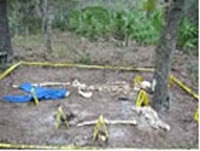
Outdoor Crime Scene
Home > 2. Crime Scenes > Outdoor Crime Scene
 An outdoor crime scene is the most vulnerable to loss, contamination and damaging effects on biological evidence in a short period of time. Individuals with access to the scene can potentially alter, destroy or contaminate evidence. The risk is greatest when the crime scene is not properly secured.
An outdoor crime scene is the most vulnerable to loss, contamination and damaging effects on biological evidence in a short period of time. Individuals with access to the scene can potentially alter, destroy or contaminate evidence. The risk is greatest when the crime scene is not properly secured.
Destruction or deterioration of evidence due to environmental conditions, such as heat, cold, rain, snow and wind call for rapid and effective protection of biological evidence. Evidence that cannot be protected under these conditions should be quickly collected without compromising its integrity. When encountering a combination of an indoor and outdoor scene, process the outdoor component first.
Nighttime outdoor crime scenes are especially problematic. Regardless of the quality of the light source used to illuminate the scene, the lack of sunlight can increase the possibility of missing or destroying evidence. Whenever possible, hold and secure outdoor crime scenes for processing until daylight.



